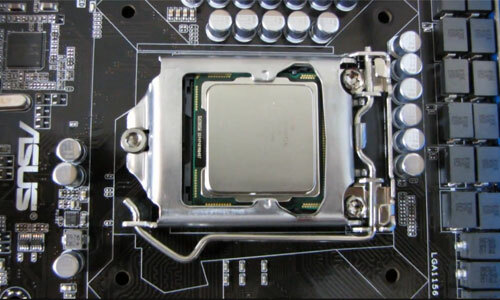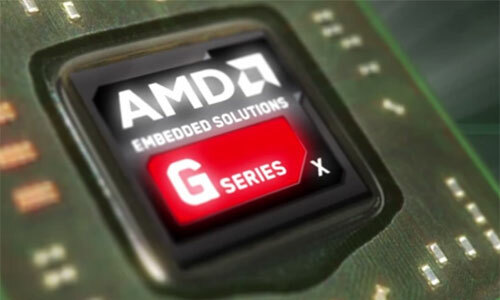The operation of the computer and all programs installed on it depends on many factors, the most important of which is the type and characteristics of the processor( CPU).However, it is not so easy to choose this element correctly.

The description of the processor or the comparative characteristics of the two processors to a low-scoring person will seem like an abracadabra. Therefore, before buying anything, we advise you to familiarize yourself with this article. The material contained in it will help to avoid mistakes and correctly decide which processor to choose.
Processor and its characteristics
As you know, the processor is that part of the electronic device that is responsible for performing computational operations. Here are the main parameters of this element:
Manufacturer
Manufacture of processors for a laptop or computer( except Apple) shared between Intel and AMD.We will describe them below. As for the processors for the tablet, there are much more manufacturers here, but the issue of choosing a processor in this area is not relevant. The same can be said about the processors for the smartphone.
Clock frequency
Reflects the number of operations performed per second. Measured in gigahertz( GHz or GHz).
Number of cores
The clock frequency can not be increased indefinitely, so the manufacturers of steel combine several chips in one chip, which became known as "cores".Multi-core processor significantly speeds up the work of programs, provided that they are appropriately optimized.
Socket( connector type)
The processor connector must match the connector on the motherboard. What type of processor is best to purchase depends on the platform of your computer.
Intel
Processors Supporters and opponents of the "stones" of this giant of microelectronics lead numerous arguments "for" and "against" their use in computer systems. Let's start with the main advantages:
- Intel processors have high speed in applications, provided there are no parallel programs running.
- Differently quite low power consumption.
- Most software products are written for Intel processors because of their great popularity.
- If you need a computer for games, then Intel processors will suit you the best way. In gaming applications, they show better performance than AMD's competitor's processors.
- "Stones", in the marking of which the value of the frequency is accompanied by the symbol "K" are excellent for overclocking. As a result, you can achieve significantly more performance than specified in the specification.
- Very well developed technology of data transfer between the processor and RAM.
- The frequency of work of second-level and third-level cash-memory in Intel processors is much higher than the same frequency in AMD processors, therefore, data processing is faster.
- Multi-threading technology implemented in Core i3 and Core i7 processors provides a significant speed increase in the work of "heavy" applications( video converters, photo editors, archivers) provided these programs are optimized for this technology.
- The system works quite stably.

Along with the advantages described, there are also disadvantages:
- The output of each new line of Intel processors is accompanied by a change in the platform( the type of connector), so you have to buy a new motherboard.
- Multitasking of processors from Intel is limited to a maximum of two powerful applications.
- The i5-i7 processors allocate a lot of heat, it's not enough to remove the standard cooler.
- Relatively high cost compared to AMD processors.
AMD
processors AMD's microprocessors traditionally are inferior in popularity to the chips of their competitor, Intel. But do not take this fact as evidence of the unequivocally worse quality of AMD products. This advantage is largely determined by the more successful marketing policy of Intel, which does not depend on quality. As it will be shown further, AMD processors in many respects exceed "stones" of the competitor. Let's list the main advantages:
- Affordable price and the most favorable price / performance ratio.
- Multiplatform. This concept implies compatibility of motherboards with both new versions of processors, and with old ones. Thus, the user can easily upgrade his computer by installing a new generation processor, and at the same time he will not have to spend money on upgrading the
- platform. If you need a full multitasking, then it's better to choose an AMD processor. It will make possible the simultaneous operation of four powerful applications, such as installing the game, packaging the archive, video conversion and unpacking the archive. Even the most "advanced" processors from Intel( Core i7) can not stand such a test, supporting the correct operation of only two applications.
- System stability.
- The ability to accurately set the supply voltage of the processor on any model of the motherboard.
- Ability to overclock FX processors( the difference in performance is 10-20%).

To the disadvantages of AMD products are the following:
- Even the best processor from AMD can be inferior to a similar product of a competitor because most popular applications are optimized for Intel.
- AMD-based processors consume more power.
- The standard cooler that comes with FX and Phenom II processors does not cope with heat removal, the user has to buy more powerful devices.
- AMD processors are somewhat inferior to competitors in the quality of work with RAM.
- Relatively slow cache speed of the second and third levels.
As you can see from the review, there is no clear leader in the production of processors. To decide who to give preference to, intel or amd, you need to think as carefully as possible about the range of tasks that the processor will solve. If a computer needs a gaming processor, then this is certainly Intel.
For serious work with several "heavy" applications involved, a chip from AMD is more likely. The main thing is not to hurry up and correctly assess all the advantages and disadvantages of each model. In this case, you will buy exactly what you need.


